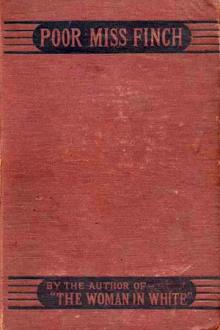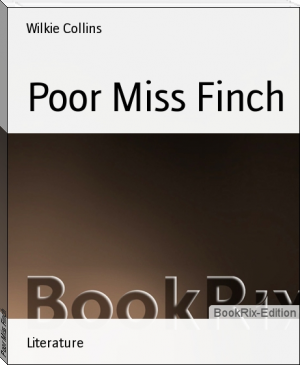Poor Miss Finch - Wilkie Collins (best books to read for beginners txt) 📗

- Author: Wilkie Collins
- Performer: -
Book online «Poor Miss Finch - Wilkie Collins (best books to read for beginners txt) 📗». Author Wilkie Collins
“Nonsense!” he said. “I’ll set things right. It’s beneath a woman like you to take notice of what a girl says in a pet. Come in!”
I doubt if I should have yielded to please any other living man. But, there is no denying it, some people have a magnetic attracting power over others. Nugent had that power over me. Against my own will—for I was really hurt and offended by her usage of me—I went back with him into the room.
Lucilla was still sitting in the place which she had occupied when I withdrew. On hearing the door open, and a man’s footsteps entering, she of course assumed that the man was Oscar. She had penetrated his object in leaving her to follow me out, and it had not improved her temper.
“Oh?” she said. “You have come back at last? I thought you had offered yourself as Madame Pratolungo’s escort to the rectory.” She stopped, with a sudden frown. Her quick ears had detected my return into the room. “Oscar!” she exclaimed, “what does this mean? Madame Pratolungo and I have nothing more to say to each other. What has she come back for? Why don’t you answer? This is infamous! I shall leave the room!”
The utterance of that final threat was followed so rapidly by its execution that, before Nugent (standing between her and the door) could get out of her way, she came in violent contact with him. She instantly caught him by the arm, and shook him angrily. “What does your silence mean? Is it at Madame Pratolungo’s instigation that you are insulting me?”
I had just opened my lips to make one more attempt at reconciliation, by saying some pacifying words to her—when she planted that last sting in me. French flesh and blood (whatever English flesh and blood might have done) could bear no more. I silently turned my back on her, in a rage.
At the same moment, Nugent’s eyes brightened as if a new idea had struck him. He gave me one significant look—and answered her in his brother’s character. Whether he was possessed at the moment by some demon of mischief; or whether he had the idea of trying to make Oscar’s peace for him, before Oscar returned—was more than I could say at the time. I ought to have stopped it—I know. But my temper was in a flame. I was as spiteful as a cat and as fierce as a bear. I said to myself (in your English idiom), She wants taking down a peg; quite right, Mr. Nugent; do it. Shocking! shameful! no words are bad enough for me: give it me well. Ah, Heaven! what is a human being in a rage? On my sacred word of honor, nothing but a human beast! The next time it happens to You, look at yourself in the glass; and you will find your soul gone out of you at your face, and nothing left but an animal—and a bad, a villainous bad animal too!
“You ask what my silence means?” said Nugent.
He had only to model his articulation on his brother’s slower manner of speaking as distinguished from his own, to be his brother himself. In saying those few first words, he did it so dexterously that I could have sworn—if I had not seen him standing before me—Oscar was in the room.
“Yes,” she said, “I ask that.”
“I am silent,” he answered, “because I am waiting.”
“What are you waiting for?”
“To hear you make your apologies to Madame Pratolungo.”
She started back a step. Submissive Oscar was taking a peremptory tone with her for the first time in his life. Submissive Oscar, instead of giving her time to speak, sternly went on.
“Madame Pratolungo has made her excuses to you. You ought to receive them; you ought to reciprocate them. It is distressing to see you and hear you. You are behaving ungratefully to your best friend.”
She raised her face, she raised her hands, in blank amazement: she looked as if she distrusted her own ears.
“Oscar!” she exclaimed.
“Here I am,” said Oscar, opening the door at the same moment.
She turned like lightning towards the place from which he had spoken. She detected the deception which Nugent had practiced on her, with a cry of indignation that rang through the room.
Oscar ran to her in alarm. She thrust him back violently.
“A trick!” she cried. “A mean, vile, cowardly trick played upon my blindness! Oscar! your brother has been imitating you; your brother has been speaking to me in your voice. And that woman who calls herself my friend—that woman stood by and heard him, and never told me. She encouraged it: she enjoyed it. The wretches! take me away from them. They are capable of any deceit. She always hated you, dear, from the first—she took up with your brother the moment he came here. When you marry me, it mustn’t be at Dimchurch; it must be in some place they don’t know of. There is a conspiracy between them against you and against me. Beware of them! beware of them! She said I should have fallen in love with your brother, if I had met him first. There is a deeper meaning in that, my love, than you can see. It means that they will part us if they can. Ha! I hear somebody moving! Has he changed places with you? Is it you whom I am speaking to now? Oh, my blindness! my blindness! Oh, God, of all your creatures, the most helpless, the most miserable, is the creature who can’t see!”
I never heard anything in all my life so pitiable and so dreadful as the frantic suspicion and misery which tore their way out from her, in those words. She cut me to the heart. I had spoken rashly—I had behaved badly—but had I deserved this? No! no! no! I had not deserved it. I threw myself into a chair, and burst out crying. My tears scalded me; my sobs choked me. If I had had poison in my hand, I would have drunk it—I was so furious and so wretched: so hurt in my honor, so wounded at my heart.
The only voice that answered her was Nugent’s. Reckless what the consequences might be—speaking, in his own proper person, from the opposite end of the room—he asked the all-important question which no human being had ever put to her yet.
“Are you sure, Lucilla, that you are blind for life?”
A dead silence followed the utterance of those words.
I brushed away the tears from my eyes, and looked up.
Oscar had been—as I supposed—holding her in his arms, silently soothing her, when his brother spoke. At the moment when I saw her, she had just detached herself from him. She advanced a step, towards the part of the room in which Nugent stood—and stopped, with her face turned towards him. Every faculty in her seemed to be suspended by the silent passage into her mind of the new idea that he had called up. Through childhood, girlhood, womanhood—never once, waking or dreaming, had the prospect of restoration to sight presented itself within her range of contemplation, until now. Not a trace was left in her countenance of the indignation which Nugent had roused in her, hardly more than a moment since. Not a sign appeared indicating a return of the nervous suffering which the sense of his presence had inflicted on her, earlier in the day. The one emotion in possession of her was astonishment—astonishment that had struck her dumb; astonishment that waited, helplessly and mechanically, to hear more.
I observed Oscar, next. His eyes were fixed on Lucilla—absorbed in watching her. He spoke to Nugent, without looking at him; animated, as it seemed, by a vague fear for Lucilla, which was slowly developing into a vague fear for himself
“Mind what you are doing!” he said. “Look at her, Nugent—look at her.”
Nugent approached his brother, circuitously, so as to place Oscar between Lucilla and himself.
“Have I offended you?” he asked.
Oscar looked at him in surprise. “Offended with you,” he answered, “after what you have forgiven, and what you have suffered, for my sake?”
“Still,” persisted the other, “there is something wrong.”
“I am startled, Nugent.”
“Startled—by what?”
“By the question you have just put to Lucilla.”
“You will understand me, and she will understand me, directly.”
While those words were passing between the brothers, my attention remained fixed on Lucilla. Her head had turned slowly towards the new position which Nugent occupied when he spoke to Oscar. With this exception, no other movement had escaped her. No sense of what the two men were saying to each other seemed to have entered her mind. To all appearance she had heard nothing, since Nugent had started the first doubt in her whether she was blind for life.
“Speak to her,” I said. “For God’s sake, don’t keep her in suspense, now!”
Nugent spoke.
“You have had reason to be offended with me, Lucilla. Let me, if I can, give you reason to be grateful to me, before I have done. When I was in New York, I became acquainted with a German surgeon, who had made a reputation and a fortune in America by his skill in treating diseases of the eye. He had been especially successful in curing cases of blindness given up as hopeless by other surgeons. I mentioned your case to him. He could say nothing positively (as a matter of course) without examining you. All he could do was to place his services at my disposal, when he came to England. I for one, Lucilla, decline to consider you blind for life, until this skillful man sees no more hope for you than the English surgeons have seen. If there is the faintest chance still left of restoring your sight, his is, I firmly believe, the one hand that can do it. He is now in England. Say the word—and I will bring him to Dimchurch.”
She slowly lifted her hands to her head, and held it as if she was holding her reason in its place. Her color changed from pale to red—from red to pale once more. She drew a long, deep, heavy breath—and dropped her hands again, recovering from the shock. The change that followed, held us all three breathless. It was beautiful to see her. It was awful to see her. A mute ecstasy of hope transfigured her face; a heavenly smile played serenely on her lips. She was among us, and yet apart from us. In the still light of evening, shining in on her from the window, she stood absorbed in her own rapture—the silent creature of another sphere! There was a moment when she overcame me with admiration, and another moment when she overcame me with fear. Both the men felt it. Both signed to me to speak to her first.
I advanced a few steps. I tried to consider with myself what I should say. It was useless. I could neither think nor speak. I could only look at her. I could only say, nervously—
“Lucilla!”
She came back to the world—she came back to us—with a little start, and a faint flush of color in her cheeks. She turned herself towards the place from which I had spoken, and whispered–-
“Come!”
In a moment, my arms were round her. Her head sank on my bosom. We were reconciled without a word. We were friends again, sisters again, in an instant.
“Have I been fainting? have I been sleeping?” she





Comments (0)